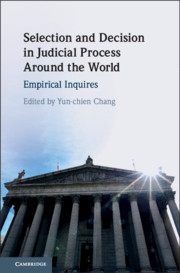Book contents
- Selection and Decision in Judicial Process around the World
- Selection and Decision in Judicial Process around the World
- Copyright page
- Dedication
- Contents
- List of Figures
- List of Tables
- List of Contributors
- Acknowledgments
- Introduction
- 1 Do Patent Law Suits Target Invalid Patents?
- 2 Platform Procedure
- 3 Speedy Adjudication in Hard Cases and Low Settlement Rates in Easy Cases
- 4 How Lower Courts Respond to a Change in a Legal Rule
- 5 Career Judge System and Court Decision Biases
- 6 Judges Avoid Ex Post but Not Ex Ante Inefficiency
- 7 When Winning Is Not Enough
- 8 The Evolution of Case Influence in Modern Consumer Standard Form Contracts
- 9 Judging Insurance Antidiscrimination Law
- 10 Are Judges Harsher with Repeat Offenders?
- 11 Does Efficiency Trump Legality?
- Index
- References
7 - When Winning Is Not Enough
Prevailing-Party Civil Appeals in State Courts
Published online by Cambridge University Press: 04 December 2019
- Selection and Decision in Judicial Process around the World
- Selection and Decision in Judicial Process around the World
- Copyright page
- Dedication
- Contents
- List of Figures
- List of Tables
- List of Contributors
- Acknowledgments
- Introduction
- 1 Do Patent Law Suits Target Invalid Patents?
- 2 Platform Procedure
- 3 Speedy Adjudication in Hard Cases and Low Settlement Rates in Easy Cases
- 4 How Lower Courts Respond to a Change in a Legal Rule
- 5 Career Judge System and Court Decision Biases
- 6 Judges Avoid Ex Post but Not Ex Ante Inefficiency
- 7 When Winning Is Not Enough
- 8 The Evolution of Case Influence in Modern Consumer Standard Form Contracts
- 9 Judging Insurance Antidiscrimination Law
- 10 Are Judges Harsher with Repeat Offenders?
- 11 Does Efficiency Trump Legality?
- Index
- References
Summary
While attention to the “vanishing trial” occupies scholarly attention, empirical work on civil appeals remains comparatively underdeveloped. Whatever is known about the small world of civil appeals is dominated by a focus on traditional appeals; that is, appeals initiated by the party who lost at trial. Comparatively far less is known about the much smaller number of prevailing-party appeals. Exploiting data from one of the largest collections of data on civil litigation in the United States, this chapter explores and describes the general empirical contours of prevailing-party civil appeals. One striking finding involves the asymmetrical distribution of prevailing-party appeals’ success. While traditional appeals favor of defendant-appellants prevailing-party appeals, by contrast, favor plaintiff-appellants. In terms of success with disrupting unfavorable trial court rulings, prevailing-party appeals succeeded at a rate that surpasses the success rate for traditional appeals. The core descriptive findings persist in an array of regression models of the decision to initiate a prevailing-party appeal as well as its success. While results in this study identify important aspects of prevailing-party appeals, particularly their asymmetric distribution of success, data limitations preclude a nuanced assessment of the competing theoretical interpretations of these findings.
Keywords
- Type
- Chapter
- Information
- Selection and Decision in Judicial Process around the WorldEmpirical Inquires, pp. 179 - 203Publisher: Cambridge University PressPrint publication year: 2019



